Halal certification fee waiver for micro, small businesses to cost Indonesia's government $433 mln over 4 years
JAKARTA – The decision by the Indonesian government to waive fees for micro and small enterprises (MSEs) to help them afford halal certification will cost the state 6 trillion rupiah ($433.18 million) over four years.
The head of the country’s halal certification agency BPJPH, Prof Sukoso, told Salaam Gateway he proposed the 6 trillion rupiah to cover the “zero tariff” programme during his meeting on Thursday (Jan 9) with finance minister Sri Mulyani Indrawati and Vice President Ma’ruf Amin.
The “zero tariff” programme means the government will cover the operational and administrative costs, such as transportation, related to the work of BPJPH and its appointed agents with regards MSEs.
“Nobody will volunteer to work the process of halal certification if there’s no transportation fee. That’s why the subsidy is important,” Prof Sukoso told Salaam Gateway.
The subsidy budget should be enough to cover the process of halal certification for more than 5 million MSEs in the next four years, said Prof Sukoso.
The 6 trillion rupiah that will come out of the state budget is based on the average fee for each micro and small business, from around 500,000 rupiah to 1.5 million rupiah, multiplied by 1 million MSEs a year.
“We want to cover halal certification for at least 1 million micro and small enterprises per year, [which means] around 1 trillion rupiah are needed from the subsidy budget, or around 6 trillion rupiah for four years of BPJPH operations,” said Prof Sukoso.
He estimates that after four years of a valid halal certificate, a micro or small business should be able to make profits and pay normal tariffs of around 1 million rupiah.
The government body hopes that businesses will be able to save around 2,000 rupiah per day, which is equivalent to a parking fee.
“We hope MSEs can grow so that they save 2,000 rupiah per day, or 10,000 rupiah per week, or 40,000 rupiah per month, or 480,000 rupiah per year, equal to 1.9 million rupiah in 4 years of holding a valid halal certificate,” said Prof Sukoso.
BPJPH officially started operations on October 17 as Indonesia’s national body overlooking the mandatory certification of all products that are halal. The authority took over from Islamic clerical body Majelis Ulama Indonesia (MUI) and its LPPOM, the assessment institute for foods, drugs, and cosmetics.
About a month before it started operations BPJPH was criticised by the government’s Ombudsman, which oversees the performance of public services, for being generally unprepared to do its job.
At the operations level, the BPJPH head told Salaam Gateway on Thursday that there is still an inadequate number of halal auditors (LPH) in the regencies and cities.
Prof Sukoso said that ideally, there should be three LPHs in each of the 500 regencies/cities.
He said BPJPH has already spent 500 million rupiah to train 226 halal auditor candidates who still need to be tested by MUI, which has become an appointed agent to pass fatawa and conduct halal testing and auditing.
In addition to subsidising MSEs, the state budget should also cover expenditure for at least 1,000 halal auditors per year, said Prof Sukoso.
($1 = 13, 847 Indonesian rupiah)
(Reporting by Yosi Winosa; Editing by Emmy Abdul Alim [email protected])
© SalaamGateway.com 2020 All Rights Reserved
